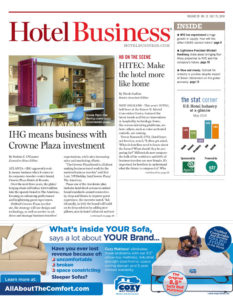Although hatred for OTAs seems to have lessened slightly over the past few years, there are still many hoteliers who are adamantly against listing their rooms on OTAs.
But no matter your opinion on OTAs, they are here to stay because consumers love the convenience and savings. They are beneficial to hotels as well—even with sky-high commission rates. While it is possible to operate a hotel without listing your property on any OTA (after all, it is possible—though not optimal—to live without sunlight), it definitely would hurt the property’s bottom line.
So my lesson today is simple: All hotels should be listing rooms on OTAs, no matter the opinion on the sites’ business practices or revenue models.
To outline why it’s an operational imperative for hotels to list their rooms on OTAs, let’s look at a comparison of two similar properties in Miami Beach, FL. Both are three-star boutique properties (less than 50 rooms) close to the ocean with comparable rooms and amenities.
The revenue manager at Hotel A hates OTAs, so he refuses to list the hotel’s rooms online. Although his occupancy numbers are very low (typically between 55% and 65%), he is able to keep 100% of the revenues from every booking.
Now, Hotel B. The revenue manager at Hotel B isn’t the biggest fan of OTAs either, but he does recognize how important they are in marketing and selling his rooms, so he consistently lists his property with the top five to six OTAs. Unfortunately, the hotel has to pay a huge commission rate, losing him money on each booking. But on the upside, Hotel B’s occupancy is consistently high (close to 90%).
In your opinion, which revenue manager is using the correct strategy to increase the property’s revenues?
If you answered Hotel B, then you can stop reading right now because you are already a revenue management star!
If you answered Hotel A, then this next part is for you.
Yes, commissions suck; losing 12-35% of every dollar is a (much) less-than-ideal situation. Yes, OTAs were designed to profit from tough financial times in the hotel industry’s history. And yes, the industry is now stuck with the online channel and OTAs, for better or for worse. But does that mean you should stop earning money, just because of your principles?
Lesson 1: 100% of zero is still zero. Think about it this way—would you rather earn 65-88% of the revenue from a booking or would you rather have the room sitting empty, earning nothing, because consumers weren’t able to find and book your room? That’s what I thought.
Lesson 2: It costs money to make money. OTAs are only making money when you’re making money, so by not using OTAs to list and sell your rooms, you’re actually stopping yourself from making money. As a revenue manager (whose job it is to optimize pricing in order to maintain or increase revenues), that seems a little counterintuitive, no?
Hopefully by now, I’ve got you convinced that OTAs are a necessary evil, and as soon as you’re done reading this article, you’ll list your rooms online and watch as bookings start to come in. (If you’re still not convinced, go back up to Lesson 1, read and repeat.) Yes, you’ll be paying up to 35% commission but just think: The other 65% is yours to keep.
So now that I’ve written about how hotels hate OTAs because of the huge commissions charged by the sites, let’s examine the other major reason some hoteliers hate OTAs: The huge amount of work it takes to manage their listings on every site. (Can you say exhausting, frustrating and time-consuming?!?)
Being a revenue manager is such a time-consuming but highly important job; between strategy meetings, data analysis, competitive analysis, manually updating prices across all OTAs and all of the other day-to-day revenue management tasks, most revenue managers cannot effectively handle more than four to six channels manually. If they do take on more, things start to fall through the cracks—pricing is not updated on a regular basis and money is lost. And let’s not even mention the increased risk of human error when revenue managers are overworked.
But here’s the Catch-22: If one OTA earns you additional revenue, then being listed on more than one OTA will earn you even more money. Even if guests don’t book through an OTA, the billboard effect alone makes OTAs valuable for a property; the billboard effect says some consumers will initially find your hotel on an OTA site and then book directly through the hotel’s website. If that hotel didn’t have a presence on OTAs, the guest would never have found and booked with that property.
While recent articles have called the billboard effect a myth propagated by OTAs to justify their high costs, “The Online Travel Shopper’s Journey” study, published by the AH&LA Consumer Innovation Forum, still showed there is “a slight likelihood (7%) that a consumer will visit an OTA and then return to brand.com to book.” In my opinion, even a 7% boost is valuable; given you don’t pay commissions to OTAs unless bookings are made through the sites.
But many hoteliers and revenue managers don’t think that way. They think about all of the work involved with the job—the time spent strategizing, collecting and analyzing data, and then manually updating the rates on all of the different websites—and most want to run away to a Caribbean island and drink piña coladas all day.
But what if you could list your property with 10 or 20 or even 100 OTAs, without dropping the (pricing) ball? What if your property’s incomes could increase 10 or 20 or even 100 times, without you having to move into your office 24/7 to manually update the rates?
That, my friend, is where technology comes in. Technology can manage your rates automatically, 24/7. Technology can increase your property’s ADR, your occupancy and your RevPAR drastically within days. In short, technology can make your hotel money… lots of money!
But that doesn’t mean revenue managers will be obsolete. Technology will give revenue managers the ability to focus their attention on what humans do best—strategizing, planning, overseeing staff, etc.—rather than mindless, never-ending analysis and updates (a task technology can handle more quickly and with less margin for error than a human ever could).
So list your property on 10 or 20 or 200 OTAs—as many as you can—and get on the technology bandwagon. Make your property earn more money…without driving your revenue manager over the deep end. It just makes good business sense (and cents)!
Jean Francois Mourier is CEO of REVPAR GURU, which provides hotels around the world with an alternative revenue management software solution.
Let us know what you think… To comment on this opinion piece, or to voice your own opinion about pertinent industry topics, please email Christina Trauthwein at [email protected]. We’d love to hear from you and share your point of view.


